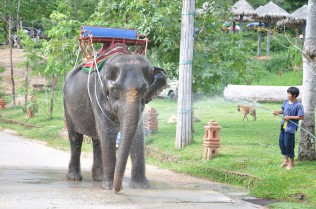The ethics of using animals for the amusement of tourists was again called into question recently following an attack on an animal keeper in Taronga Park Zoo in Sydney, Australia. Lucy Melo was rushed to hospital in a critical condition after being crushed against a post by a baby elephant during a morning training session on October 19.
This follows the death of Franklin Zoo director and keeper Dr. Helen Schofield, who was crushed to death by the trunk of a former circus elephant in New Zealand in April this year. Both animal workers were reputed to have excellent relationships with the elephants involved, and both situations are believed to be accidents.
PETA (People for the Ethical Treatment of Animals) has called for zoos to phase out elephant exhibits. The often-controversial organization argues that the lack of space and reduced opportunity for normal socializing can lead to physical ailments as well as emotional trauma.
“The recent incident at Taronga Zoo shows once again that these animals are not designed for a life in captivity,” said Claire Fryer, PETA Australia’s campaign coordinator. “They are bred or captured for a lifetime of misery.”

But zoos are not the only place where the treatment of elephants has been of concern for animal activist groups. Elephants are regularly used as a tourist attraction in Asia, and elephant riding is considered a “must” when visiting Thailand. In addition to providing rides, elephants are often used to perform circus tricks, paint pictures, or give massages.
Activists say baby elephants are still being forced into submission through beatings, hunger, and other torments designed to break the animals’ spirit, despite claims to the contrary. “Every trained elephant in Thailand has faced this cruel torturing,” the Thai group Animal Activist Alliance (AAA) wrote in an article on the Wildlife Friends Foundation Thailand (WFFT) website. AAA argues that the use of this method, known as Phajaan, is in response to the growing demand for trained elephants in tourism hotspots across Thailand.
Wildlife consultant and conservationist Ian Redmond told Wanderlust magazine last year that many elephant handlers are now motivated by money more than anything else. “Consider that when wild animals become a commercial commodity, their welfare will likely suffer,” Redmond said.
UK-based charity Elephant Family is currently campaigning for the halt of the illegal live-trade of baby elephants between Burma and Thailand. According to a recent investigative report by Elephant Family, Ecologist Film Unit and Link TV, the hunting of wild elephants is illegal in Thailand, but this does not extend to neighboring Burma. The last, healthy populations of Asian elephants in the wild are in Burma and, with baby elephants worth up to 600,000 baht (approximately 20,000 US dollars), these herds are being threatened by the burgeoning tourist industry in Thailand.
Elephant Family is not calling for a boycott of elephant camps, but the organization is demanding a halt to the systematic removal of Asian elephants from the wild. Many elephant sanctuaries are dedicated to the survival or rehabilitation of elephants, and often rely on tourism funds in order to survive.
The Elephant Nature Park, near Chiang Mai, is run by the Elephant Nature Foundation and offers opportunities for visitors to see rescued elephants living naturally. The Wildlife Friends Foundation Thailand runs an Elephant Refuge and Education Center for domesticated elephants rescued from the streets of Bangkok and other cities. Boon Lott’s Elephant Sanctuary near Sukhothai has also been recommended by conservationists.
Thailand’s Queen Sirikit has also supported initiatives to protect and rehabilitate domesticated elephants or elephants severely affected by logging and other threats since the late 1990s. In 2002, she supported the creation of the Elephant Reintroduction Foundation, which works to reintroduce elephants into the wild and to create greater understanding of elephant conservation.
There are steps which travelers can take to minimize their impact and avoid fueling the demand that leads to illegal poaching. Research ahead of your holiday to ensure that any sanctuaries you visit are ethically managed. Check the conditions of the animals being used for trekking, particularly looking for wounds around the elephant’s head or mouth. Finally, do not be afraid to say no, or to ask to walk beside the elephant rather than on its back.
Read Ethical Traveler's Reprint Policy.
